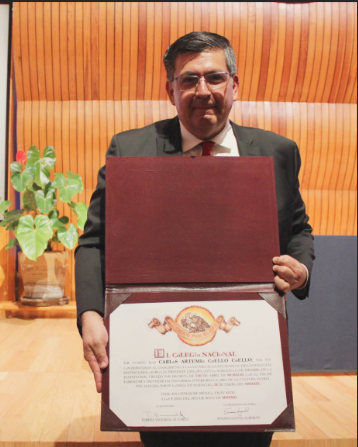Pioneers
6. Mathematics of computing
6.1. Carlos Coello

Figure 1: Carlos A. Coello Coello
Source: Tecnológico de Monterrey (2025)
Downloadable teaching resource
Overview
Carlos A. Coello Coello is a leading Mexican computer scientist renowned for his pioneering work in evolutionary multi-objective optimisation. He currently serves as Distinguished Visiting Professor at Tecnológico de Monterrey and Senior Researcher at CINVESTAV–IPN. His design of foundational stochastic algorithms has enabled advances in engineering and aerospace problem-solving, earning him prestigious honours such as the IEEE Evolutionary Computation Pioneer Award and the MCDM Edgeworth–Pareto Medal (IEEE, 2021; Tecnológico de Monterrey, 2025).
Background
Born in Tonalá, Chiapas, Mexico, Carlos A. Coello Coello graduated with honours in Civil Engineering from the Universidad Autónoma de Chiapas in 1991. He later earned an MSc (1993) and PhD (1996) in Computer Science from Tulane University, where his doctoral thesis pioneered the use of evolutionary algorithms for multi-objective optimisation (Rijcken, 2006; Tecnológico de Monterrey, 2025).
Upon returning to Mexico, he became a full professor and senior researcher at CINVESTAV–IPN, where he founded the Evolutionary Computation Group. He later joined Tecnológico de Monterrey as a Distinguished Visiting Professor, contributing significantly to its international stature in computational intelligence (Tecnológico de Monterrey, 2025).

Figure 2: Carlos Coello Coello being admitted to El Colegio Nacional
(Gobierno de México, 2023)
Contributions
Carlos A. Coello Coello has made foundational contributions to the field of evolutionary computation, particularly in the development and refinement of multi-objective optimisation algorithms. His research has influenced both the theoretical underpinnings and practical applications of metaheuristics in addressing complex real-world optimisation challenges (Coello Coello et al., 2007; IEEE Xplore, 2025).
Development of benchmark-setting algorithms: Coello is credited with designing several influential evolutionary algorithms for multi-objective optimisation, including the Micro-Genetic Algorithm (μGA) (Coello Coello and Pulido, 2001) and improved variants of Particle Swarm Optimisation (PSO) tailored to multi-objective problems (Coello Coello et al., 2004). These algorithms have been widely implemented in domains such as aerospace engineering, structural mechanics, and industrial systems optimisation (Tecnológico de Monterrey, 2025).
Theoretical advances in constraint-handling and diversity preservation: His early theoretical work addressed fundamental challenges in maintaining population diversity while satisfying complex constraints- issues central to the performance of evolutionary algorithms. This led to the creation of frameworks capable of solving highly constrained, multi-dimensional problems with greater reliability and efficiency (Coello Coello, 1999; Coello Coello, 2002).
Leadership in academic publishing and dissemination: Coello has published more than 550 peer-reviewed works, including numerous high-impact journal papers and the authoritative textbook Evolutionary Algorithms for Solving Multi-Objective Problems (Coello Coello et al., 2007). He currently serves as Editor-in-Chief of IEEE Transactions on Evolutionary Computation and contributes to several other editorial boards in computational intelligence and optimisation (IEEE Xplore, 2025).
Mentorship and global influence as a leading researcher at CINVESTAV-IPN: Coello has supervised a significant number of doctoral and postdoctoral researchers. His work is internationally recognised, as evidenced by prestigious keynote invitations, collaborative research networks, and awards such as the IEEE Kiyo Tomiyasu Award, the Mexican National Medal of Science and Arts, and the MCDM Edgeworth-Pareto Award (Tecnológico de Monterrey, 2025; IEEE Xplore, 2025).
Feature: Evolutionary Algorithms for Solving Multi-Objective Problems
The 2007 second edition of Evolutionary Algorithms for Solving Multi-Objective Problems, authored by Carlos A. Coello Coello, Gary B. Lamont and David A. Van Veldhuizen, marked a major shift in how multi-objective optimisation (MOO) was conceptualised and applied in computational science (Coello Coello, Lamont and Van Veldhuizen, 2007). Widely recognised as the most comprehensive consolidation of evolutionary multi-objective optimisation (EMO) research at the time, it became the defining technical reference for the field.
The book systematically explored the theoretical foundations of EMO - covering Pareto optimality, fitness assignment strategies, constraint-handling techniques, and diversity preservation mechanisms- while integrating these into a robust, unified framework for algorithm design and performance evaluation. This structure enabled researchers and engineers to analyse, improve, and adapt EMO methods across a wide range of optimisation challenges.
Its impact is especially evident in how it standardised EMO evaluation. By formalising key performance metrics (such as hypervolume and generational distance) and benchmarking protocols, the book laid the foundation for reproducible comparisons between competing algorithms. This continues to inform algorithm selection in disciplines including engineering, operations research, and decision sciences- fields where solving trade-offs between conflicting objectives is essential.
Moreover, the work bridged theory and practice through detailed case studies in control systems, network optimisation, structural mechanics, and logistics. These examples demonstrate EMO’s ability to tackle complex real-world problems - showing how evolutionary approaches can balance computational flexibility with high reliability.
In short, this book did not merely summarise the state of EMO research- it defined its methodology, language, and global standards. It remains a cornerstone of citation in both academic and industrial settings, continuing to shape how multi-objective problems are formulated, analysed, and solved today.
See also
IEEE Transactions on Evolutionary Computation – Editorial Archive: An influential journal co-edited by Coello Coello, covering the latest peer-reviewed advances in evolutionary algorithms, including multi-objective optimisation techniques.
ResearchGate – Current Trends in Evolutionary Multi-objective Optimization: A scholarly overview of emerging approaches in EMO, highlighting algorithmic innovations and application areas influenced by Coello Coello’s foundational work.
References and further reading
CINVESTAV–IPN (no date) Carlos A. Coello Coello – Honours and Awards. Available at: https://delta.cs.cinvestav.mx/~ccoello/honors.html (Accessed: 13 July 2025).
Coello Coello, C. A. (1999) ‘A comprehensive survey of evolutionary-based multiobjective optimization techniques’, Knowledge and Information Systems, 1(3), pp. 269–308. Available at: https://doi.org/10.1007/BF03325101 (Accessed: 13 July 2025).
Coello Coello, C. A. and Pulido, G. T. (2001) ‘A micro-genetic algorithm for multiobjective optimization’, Lecture Notes in Computer Science, 1993, pp. 126–140. Available at: https://doi.org/10.1007/3-540-44719-9_10 (Accessed: 13 July 2025).
Coello Coello, C. A. (2002) ‘Theoretical and numerical constraint-handling techniques used with evolutionary algorithms: a survey of the state of the art’, Computer Methods in Applied Mechanics and Engineering, 191(11–12), pp. 1245–1287. Available at: https://doi.org/10.1016/S0045-7825(01)00323-1 (Accessed: 13 July 2025).
Coello Coello, C. A., Pulido, G. T. and Lechuga, M. S. (2004) ‘Handling multiple objectives with particle swarm optimisation’, IEEE Transactions on Evolutionary Computation, 8(3), pp. 256–279. Available at: https://doi.org/10.1109/TEVC.2004.826067 (Accessed: 13 July 2025).
Rijcken, E. (2006) Science, passion, and the future of multi-objective optimisation: An in-depth interview with Professor Carlos Artemio Coello Coello. BNVKI Newsletter, 23(4). Available at: https://ii.tudelft.nl/bnvki/interview-with-professor-coello-coello/ (Accessed: 13 July 2025).
Coello Coello, C. A., Lamont, G. B. and Van Veldhuizen, D. A. (2007) Evolutionary algorithms for solving multi-objective problems. 2nd edn. New York: Springer. Available at: https://link.springer.com/book/10.1007/978-0-387-36797-2 (Accessed: 13 July 2025).
Deb, K. (2007) ‘Current trends in evolutionary multi-objective optimization’, International Journal for Simulation and Multidisciplinary Design Optimization 1(1):1-8. Available at: https://www.researchgate.net/publication/275157761_Current_trends_in_evolutionary_multi-objective_optimization (Accessed: 17 September 2025).
Gobierno de México (2023) Carlos Coello Coello es el octavo investigador del Cinvestav en ingresar a El Colegio Nacional. Available at: https://conexion.cinvestav.mx/Publicaciones/carlos-coello-coello-es-el-octavo-investigador-del-cinvestav-en-ingresar-a-el-colegio-nacional (Accessed: 06 September 2025).
IEEE (2021) Past Award Recipients. Available at: https://cis.ieee.org/awards/past-recipients (Accessed 17 September 2025)
IEEE (2025) IEEE Transactions on Evolutionary Computation – Editorial Archive. Available at: https://ieeexplore.ieee.org/xpl/RecentIssue.jsp?punumber=4235 (Accessed: 13 July 2025).
IEEE Xplore (2025) Carlos A. Coello Coello – Author Profile. Available at: https://ieeexplore.ieee.org/author/37275949600 (Accessed: 13 July 2025).
Tecnológico de Monterrey (2025) Carlos A. Coello Coello – Distinguished Visiting Professor in Computer Science and Computational Intelligence. Available at: https://tec.mx/en/our-faculty/eic/carlos-coello?srsltid=AfmBOorKuYlr86kMrl9jO-tn4TXkiszoUlQ1NZ54b5AQqenqZQ-rWRVa (Accessed: 11 July 2025).